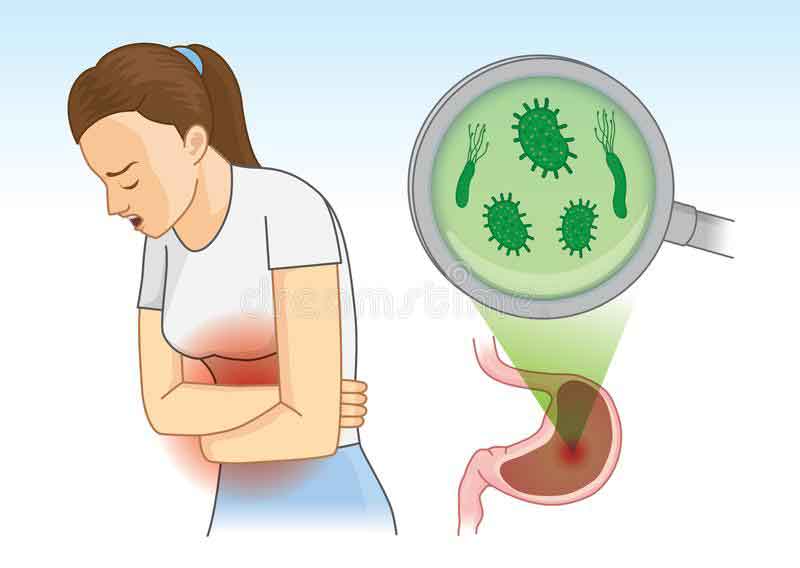Upper abdomen pain is generally because of short-term, minor trouble, such as indigestion or gas. However, persistent or severe upper abdominal pain may show a possibly serious condition. If the pain is severe or does not stop within 2 days, consult your doctor.
Organs in the upper abdomen include :-
- Stomach
- Spleen
- Liver
- Gallbladder
- Parts of the pancreas
- Parts of the small intestine
- Parts of the large intestine
- Muscular abdominal wall
Issues with any of these structures can cause pain in the upper abdomen. The pain may be mild or severe and may feel like cramps or a burning sensation. Other symptoms include nausea, fever, and cough.
Abdominal pain may spread or radiate to other places, such as the heart, lungs, or blood vessels. Problems with the kidneys in the back of the abdomen can also lead to pain in the upper abdomen.
What should we know about upper abdominal pain?
There are numerous types of upper abdominal pain. For example, you may feel slight discomfort, a burning sensation, or a stabbing pain. It can be felt in specific areas or across the upper abdomen. Pain also moves from one body part to another. For example, you may feel the pain that starts in your chest such as heartburn that spreads to the upper abdomen.
Location and type of pain can be important for diagnosing possible causes. For example, pain in the pancreas or kidneys may begin in the abdomen and spread to the back. Shingles can cause inflammation of the skin and can also cause abdominal pain if the infection spreads there. Pain from a heart attack or pneumonia usually starts in the chest, but pain can also be felt in the upper abdomen.
Symptoms associated with upper abdominal pain, such as nausea and vomiting, also help the diagnosis. A healthcare professional will do a physical examination and ask about the type and duration of pain and related symptoms. They may also use an abdominal ultrasound to help diagnose upper abdominal pain.

Upper abdomen pain treatment at Texas Specialty Clinic :
- For upper abdominal pain, surgical and non-surgical therapies can be performed.
- First, our doctors look at non-surgical options. Our healthcare professionals will tell you if you need surgery and will go ahead with your care appropriately.
- All kinds of upper abdominal pain conditions are treated by our physicians.
- Our doctors have the knowledge, experience, and tools necessary to handle even the most difficult abdominal conditions.
- If you experience upper abdominal pain, call for medical care immediately.
- For treatment of upper abdominal pain book an appointment at Texas Specialty Care dial (469) 545-9983.
What are the causes of upper abdominal pain?
Pain in the upper abdomen is most often caused by the digestive system, but can also be caused by disorders of the circulatory system, kidneys, respiratory system, or abdominal wall. Acute upper abdominal pain is pain that lasts up to 5 days.

Upper abdominal pain caused due to digestive system includes:
- Gastroenteritis
- Inflammatory bowel disease
- Irritable bowel syndrome
- Liver disease, including hepatitis
- Pancreatitis
- Diverticulitis
- Gallbladder disease or gallstones
- Gastroesophageal reflux disease
- Stomach flu
- Food intolerance, such as lactose intolerance
- Gastritis
- Celiac disease
Other causes of upper abdominal pain include:
- Cancer
- Pneumonia
- Pleurisy
- Hernia
- Shingles
- Kidney infection
- Kidney stones
- Nerve compression
- Muscle strain
What are the symptoms of upper abdominal pain?
Pain in the upper abdomen can be a symptom of a serious or potentially life-threatening condition.
Conditions of this type include :-
- Significant abdominal trauma
- Sickle cell crisis
- Preeclampsia
- Peritonitis
- Cholangitis
- Cholecystitis
- Pancreatitis
- Heart attack
- Colonic volvulus
- Intestinal ischemia
- Abscess
- Aortic aneurysm
- Bowel obstruction
Pain in the upper abdomen can occur with other conditions, including those that affect other body systems such as the digestive tract and circulatory (cardiovascular) system.

Other symptoms that may occur with abdominal pain are :-
- Nausea
- Changes in bowel movements
- Bloody stool
- Gas
- Diarrhea
- Constipation
- Indigestion
- Belching
- Bloating
- Abdominal muscle spasms
- Body aches
- Cough
- Fever
- Weight loss
- Rash
- Numbness or tingling
When to visit a doctor?
Abdominal pain is a common condition with numerous possible causes. Some of these conditions are serious and need urgent medical attention to diagnose or rule out.
Call your doctor or other health care professional about pain in your upper abdomen if you notice any of the following :-
- Stomach pain that wakes you up
- Discomfort lasting 24-48 hours
- Mild pain lasting more than a few days
- Vomit
- Rash
Please note that medical needs may vary depending on the patient’s age, health, and medical history.
Complications of upper abdominal pain :-
Complications of untreated upper abdominal pain because of serious medical conditions include :-
- Sepsis.
- Organ failure.
- Spread of infection.
- Bowel infarction due to prolonged ischemia.
- Spread of cancer.
How is upper abdominal pain diagnosed?
Diagnosing upper abdominal pain involves a thorough physical examination, taking a medical history, and possibly imaging and blood tests
Imaging tests include :-
- Abdominal ultrasound, a common imaging test used to diagnose abdominal pain.
- CT scan.
- Upper gastrointestinal endoscopy, or esophagogastroduodenoscopy, to examine the lining of the esophagus, stomach, and first part of the small intestine.
What are the treatments available for upper abdominal pain?
Treatment for abdominal pain depends on the cause. Some causes can be treated at home. For less serious causes like stomach flu, treatment includes rest and fluid intake until the body clears the viral infection.
Some types of treatment and their causes include :-
- Antacids for heartburn
- Pain relievers for muscle tension
- Antibiotics against bacterial infections
- Nerve blocks for severe pain caused by pancreatitis
- Oral or intravenous fluids for dehydration due to vomiting
Surgery to correct structural problems, such as hernia, or to treat certain conditions, such as stomach ulcers or kidney stones.
Visit Texas Specialty Clinic to diagnose and treat upper abdominal pain, call (469) 545-9983 to book an appointment.

